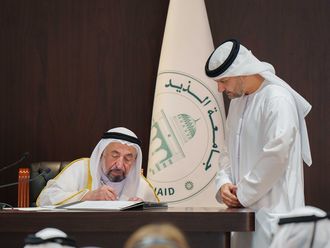Dubai: Arabic private school teachers say they are faced with many challenges when it comes to making the language more appealing to youth in the UAE.
Teachers told Gulf News that curriculum, which focuses on memorising and old teaching habits, and globalisation are among the many challenges they face.
Bassam Al Sayed, Arabic and Islamic teacher at Uptown School in Dubai, said lack of practice [in speaking Arabic] at home and at school is a major factor.
“All subjects are taught in the English language, so students practise English all day, except for the 60 minutes during the Arabic lesson,” said Al Sayed. “Another challenge is the fact that parents themselves talk in English with their children.”
The onus of making Arabic more appealing to students, said Al Sayed, is up to teachers and one way they can do this, he said, is by ditching the old teaching methods.
“Failure to engage students because of the use of old teaching methods can affect the quality of the language taught. Today’s students have differing attention spans and expect to be entertained in an interactive, persuasive way,” he said.
Teachers, said Al Sayed, should adopt 21st-century teaching methods to make Arabic more attractive.
“The most important factor is the teacher and his teaching capabilities and his grasp of the language,” he said. He cited the change in results when his school integrated technology with teaching. “We have produced better results at our school by integrating technology into the learning plan. We started with recording the students on video to track their improvement through the years.”
At the Knowledge and Human Development Authority’s ‘What Work’s Arabic Plus event, Gulf News spoke to Arabic and Islamic teacher Mariam Abdullah (who preferred not to name the school where she works) and who believes that improving Arabic proficiency among students requires curriculums to be changed. “English is the language of the century and if you can’t speak English, you can’t get a job,” said Mariam. “I think curriculums should be changed to meet the needs of students in this day and age.”
She is of the firm belief that complicated material in Arabic curriculums should be omitted.
“Most students complain about Arabic grammar, which is taught comprehensively at schools. Unless students want to major in Arabic literature, they would not use [advanced] grammar in their day-to-day life so I think curriculums should teach basic grammar instead. This will make Arabic less intimidating.”
Jaber Jawhar, the grade six to 10 Arabic teacher at Westminster School, on the other hand, believes that teaching Arabic to Arab students just two times a week is not enough.
“I see that most students are weak in reading and grammar. We don’t have parental support to improve this because, unfortunately, many parents believe it is prestigious to be proficient in English and so don’t practise [Arabic] with their children at home.”
To improve the use of Arabic, Jawhar believes students themselves must change the perception they have of the language — that it is difficult and unnecessary.
“Parents must also make sure to communicate with their children in their mother tongue. The number of Arabic classes should also be increased per week to at least five instead of two to three classes. Another important solution is that teachers should make their classes more engaging by incorporating activities like field trips.”
When it comes to students who learn Arabic as a second language, Amal Mohammad, who teaches Arabic as a second language to kindergarten students at Ambassador school which follows the Indian curriculum, said learning a second language is hard and needs patience.
“It is hard for anyone to learn a second language, especially one that is not practised at home. That in itself is a challenge. However, if you start young and you teach it in a fun way, young students pick it up easily.”
The biggest challenge faced by her students — who are mostly Indians — is that they are taught standard Arabic in school, Amal said.
“This is a problem because most Arabs in the UAE come from different countries and so speak in different accents that the students — who only learn standard Arabic — do not understand. Another challenge is that they only learn at school, but they do not actually practise it [outside of it] because there is no one at home who speaks the language,” she said.












